Book contents
- Frontmatter
- Contents
- List of Illustrations
- Contributors
- Acknowledgements
- 1 Introduction – Tanzanian Development: A Comparative Perspective
- 2 The Political Economy of Tanzania 1967–2017: Reimagining the State
- 3 Reflections on the Tanzanian Trajectory: Decline and Recovery
- 4 Agricultural Development in Tanzania
- 5 Assets and Poverty Dynamics: The Methodological Challenges of Constructing Longitudinal Surveys in Tanzania
- 6 Contract Farming in Tanzania: Experiences from Tobacco and Sunflower
- 7 ‘We Just Sell Water – That is All We Do’: Two Cases of Small-scale Irrigation in Tanzania
- 8 The Industrial Development of Tanzania in Comparative African Perspective
- 9 Competitiveness in African Manufacturing: Some Evidence from Tanzania
- 10 ‘Good Life Never Comes Like Dreams’: Youth, Poverty and Employment in Arusha
- 11 International Aid to Tanzania – with some comparisons from Ghana and Uganda
- 12 Real Exchange Rate Changes and Export Performance in Tanzania and Ethiopia
- 13 Economic Leakage as a Constraint on Tourism's Effective Contribution to Local Economic Development in Tanzania
- 14 Extractive Industry Revenues and their Expenditure in Local Government Authorities: The Case of the Gold Service Levy in Geita District Council in Tanzania
- 15 Conclusion
- References
- Index
3 - Reflections on the Tanzanian Trajectory: Decline and Recovery
Published online by Cambridge University Press: 24 October 2019
- Frontmatter
- Contents
- List of Illustrations
- Contributors
- Acknowledgements
- 1 Introduction – Tanzanian Development: A Comparative Perspective
- 2 The Political Economy of Tanzania 1967–2017: Reimagining the State
- 3 Reflections on the Tanzanian Trajectory: Decline and Recovery
- 4 Agricultural Development in Tanzania
- 5 Assets and Poverty Dynamics: The Methodological Challenges of Constructing Longitudinal Surveys in Tanzania
- 6 Contract Farming in Tanzania: Experiences from Tobacco and Sunflower
- 7 ‘We Just Sell Water – That is All We Do’: Two Cases of Small-scale Irrigation in Tanzania
- 8 The Industrial Development of Tanzania in Comparative African Perspective
- 9 Competitiveness in African Manufacturing: Some Evidence from Tanzania
- 10 ‘Good Life Never Comes Like Dreams’: Youth, Poverty and Employment in Arusha
- 11 International Aid to Tanzania – with some comparisons from Ghana and Uganda
- 12 Real Exchange Rate Changes and Export Performance in Tanzania and Ethiopia
- 13 Economic Leakage as a Constraint on Tourism's Effective Contribution to Local Economic Development in Tanzania
- 14 Extractive Industry Revenues and their Expenditure in Local Government Authorities: The Case of the Gold Service Levy in Geita District Council in Tanzania
- 15 Conclusion
- References
- Index
Summary
The U-shaped arc of Tanzania's post-independence economic trajectory is broadly familiar. It divides into two periods of unequal length. After a brief period of growth immediately following independence, Tanzania entered an era of economic decline that lasted for about twenty years, from the mid-1960s through the mid-1980s. This was followed by economic reforms that have led to three decades of economic expansion, from the mid-1980s to the present. Several questions suggest themselves: What caused the economic decline? Why did it persist for so long? Why did Tanzania change its policies in the mid-1980s? And, what has the change meant for ordinary Tanzanians?
Introduction
Academic discussions of Tanzania frequently begin – and often end – with consideration of the influence of founder-president Julius Nyerere. His humanistic socialism portrayed a self-reliant society that would devote its resources to improving economic conditions for the poorest Tanzanians. Nyerere's philosophical idealism provides ongoing subject-matter for nostalgic discussions in scholarly conferences and required reading in university classes on African politics. It also provides a counter-culture of social justice against which some Tanzanians judge the current administration. Some narrators abet this imagery by portraying the Tanzanian story as one of Nyerere's personal idealism brought low by a fatal combination of forces including self-interested political opponents, the class interests of those who might lose out under socialism, and the corrosive force of individual acquisitiveness (Mwakikagile 2009).
Not all agree. Coulson (2013) directs attention to the dissonance between Nyerere's vision and the dismal reality of an economy whose failings placed its most valued components, universal access to primary education and basic health services, at risk. Tanzania's decline is well documented. The World Bank's classic study of Africa's economic crisis, Accelerated Development in Sub-Saharan Africa: An Agenda for Action (World Bank 1981), known as the Berg Report, singled out Tanzania alongside Ghana as one of Africa's leading examples of poor economic performance. The Berg Report (p. 26) emphasized the loss of foreign exchange earnings caused by a decline in agricultural exports:
During the last 15 years, the volume of exports in Tanzania has declined dramatically. In 1980, the total exports of the country's major commodities (cotton, coffee, cloves, sisal, cashew nuts, tobacco and tea, which account for two-thirds of the nation's export earnings) were 28 percent lower than in 1966 and 34 percent lower than in 1973.
- Type
- Chapter
- Information
- Tanzanian DevelopmentA Comparative Perspective, pp. 32 - 57Publisher: Boydell & BrewerPrint publication year: 2019



